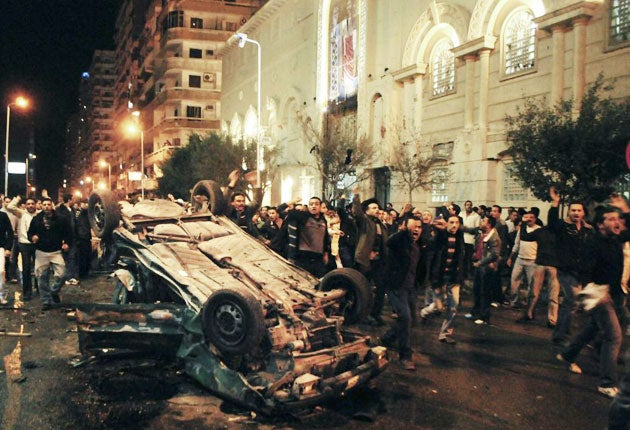Twenty-one dead in Egypt New Year's Mass bombing

Your support helps us to tell the story
From reproductive rights to climate change to Big Tech, The Independent is on the ground when the story is developing. Whether it's investigating the financials of Elon Musk's pro-Trump PAC or producing our latest documentary, 'The A Word', which shines a light on the American women fighting for reproductive rights, we know how important it is to parse out the facts from the messaging.
At such a critical moment in US history, we need reporters on the ground. Your donation allows us to keep sending journalists to speak to both sides of the story.
The Independent is trusted by Americans across the entire political spectrum. And unlike many other quality news outlets, we choose not to lock Americans out of our reporting and analysis with paywalls. We believe quality journalism should be available to everyone, paid for by those who can afford it.
Your support makes all the difference.A bomb, possibly carried by a suicide bomber, exploded in front of a Coptic Christian church in the Egyptian city of Alexandria early today, killing at least 21 people.
After the blast, which took place as worshippers emerged from a New Year's Mass, enraged Christians at the church clashed with police and stormed a nearby mosque, prompting fights and volleys of stone throwing with Muslims, police and witnesses said - a sign of the sectarian anger that has been arising with greater frequency in Egypt.
Nearly 1,000 Christians were attending the Mass at the Saints Church in the Mediterranean port city of Alexandria, said a priest at the church, Father Mena Adel. The service had just ended, and worshippers were leaving the building when the blast went off, about a half-hour after midnight.
"I was inside the church and heard a huge explosion," Fr Adel said. "People's bodies were in flames."
The blast was originally thought to come from a car parked outside the church, but police said they were still investigating whether the car had been rigged with explosives or if a bomb had been placed under it. Witnesses reported seeing the charred chassis of the destroyed car, with the remains of several bodies nearby and dozens wounded.
The Interior Ministry later said in a statement that there was no sign the blast originated from any of the destroyed cars, suggesting that "it is likely that the device which exploded was carried by a suicide bomber who died among others".
Alexandria governor Adel Labib blamed al Qaida for the blast, pointing to recent threats by the terror group's branch in Iraq to attack Christians.
"The al-Qa'ida organisation threatened to attack churches inside Egypt," he told state TV.
After the explosion, some Christians from the church clashed with police in anger over the blast. The Christians hurled stones at police and a nearby mosque, chanting, "With our blood and soul, we redeem the cross."
A photographer at the scene said the protesters stormed into the mosque, throwing books inside out on to the street. The protest sparked clashes with Muslims, as both sides began throwing stones and bottles at each other in the streets.
The attack comes at a time of rising sectarian tension in Egypt and the broader region. In November, hundreds of Christians rioted in the capital, Cairo, smashing cars and windows after police violently stopped the construction of a church. The rare outbreak of Christian unrest in the capital left one person dead.
Christians are believed to make up about 10 per cent of Egypt's mainly Muslim population of nearly 80 million people, and they have grown increasingly vocal in complaints about discrimination. There have been occasional attacks targeting Christians - most notably, in January 2009, seven Christians were killed in a drive-by shooting on a church in southern Egypt during celebrations for the Orthodox Coptic Christmas. The Saints Church in Alexandria targeting early Saturday also came under attack in April 2006, when a man with a knife stabbed worshippers.
At the same time, al-Qa'ida-linked militants have carried out a campaign of attacks against Christians in Iraq, killing 68 in a church siege in October and two more Christians in attacks in Baghdad on Thursday.
The attacks in Iraq have an unusual connection to Egypt. Al-Qa'ida in Iraq says it is carrying out the campaign of anti-Christian attacks in the name of two Egyptian Christian women who reportedly converted to Islam in order to get divorces from their husbands. The Coptic Church forbids almost all divorce, meaning leaving the religion is sometimes the only option to escape an abusive or unhappy marriage.
The two women have since been secluded with Coptic Church authorities. Islamic hard-liners in Egypt have held frequent protests in past months, accusing the Church of imprisoning the women and forcing them to renounce Islam and return to Christianity.
Al Qaida in Iraq says it is carrying out attacks on Christians in that country until Egyptian Church officials release the two women. The Church denies holding the women against their will.
Join our commenting forum
Join thought-provoking conversations, follow other Independent readers and see their replies
Comments